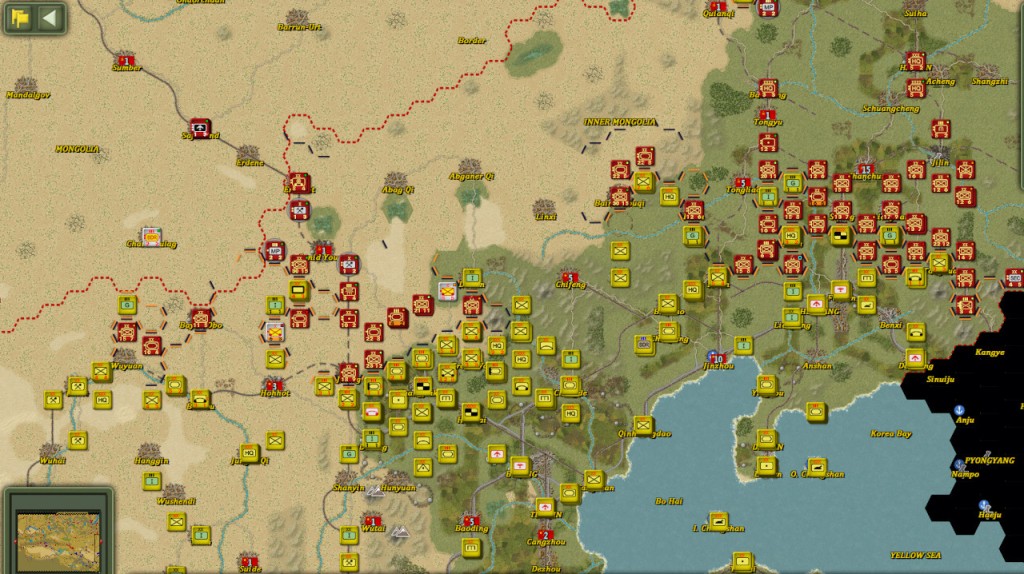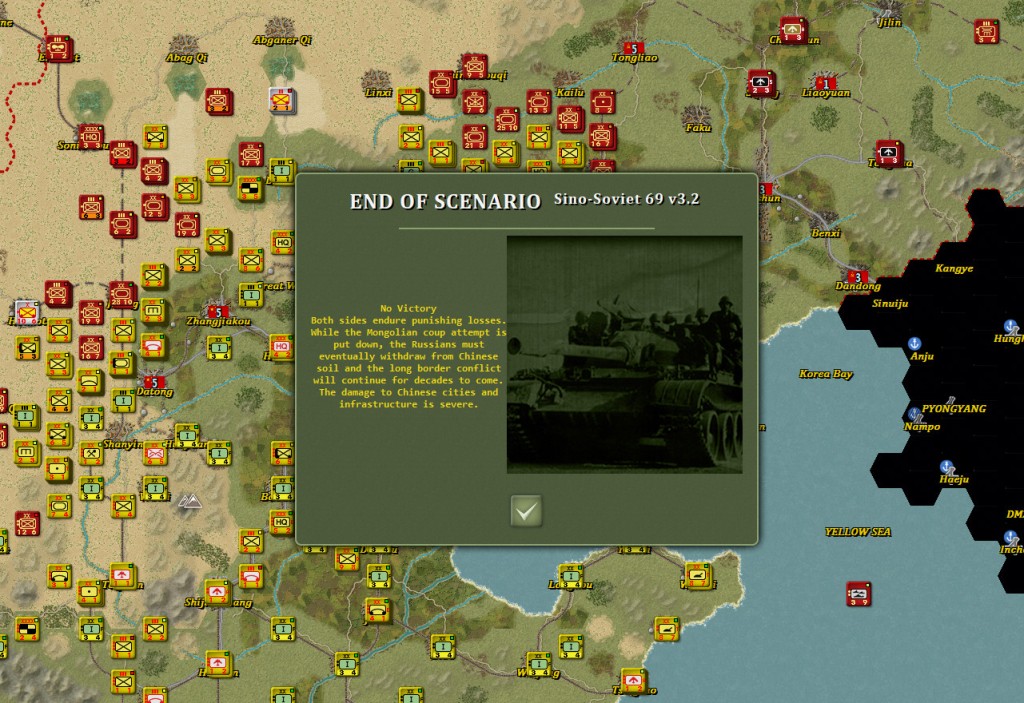I left off in the middle of my playing the linked TOAW scenario to focus on the actual events of 1969. I won’t leave you hanging, although there isn’t much left to say when wrapping up.
In my prior post, I thought a little about the connection between this minor border skirmish and the global politics of nuclear weapons. I mentioned how the conflict was between two of the world’s five recognized nuclear powers… but on that account, this was hardly an even match-up. The Soviet Union had, of course, raced to catch up with America’s nuclear capabilities and had tested their first atomic bomb in 1949. China, by contrast, was then new to the nuclear game. China’s first atomic test did not occur until 1964. Their program, coming about in the political environment that it did, was as much to be a deterrent to the Soviet Union as it was to America and the West.
In my mind, if not necessarily in the mind of the scenario’s developer, a war in this place and time was very much about these nuclear capabilities and the USSR’s desire to nip the nuclear ambitions of their neighbor in the bud.
It stands to reason, then, that this one features the ability to make use of chemical and nuclear weapons. This is a feature of many of the Cold War scenarios from The Operational Art of War, albeit one that I can’t remember1 ever exercising. It is certainly the gorilla in the room2 for any setting that models an escalation of superpower confrontation. It represents one more appealing feature of this scenario; the possibility that a border clash could spin out of control into a truly world-changing event (and not just a hypothetical-major-invasion kind of world-changing event).

As the Soviets, I would never initiate such an escalation. The Chinese, on the other hand, might have been motivated to do so.
My mindset while playing Sino – Soviet War 1969 was at all time colored by that background reading surrounding what might have been happening in August of 1969. The scenario’s language itself focuses on the border disputes and instability within the political control exerted by the two communist powers. Knowing just enough to be dangerous, I could not help but imagine that the real goal for the Soviet player, within this hypothetical, was the capture and dismantling of Chinese nuclear facilities.
Such a background story is not incompatible with the scenario victory conditions as they are given. I don’t know where those Chinese nukes might be on this map but one assumes that their capture would involve taking and occupying, at least temporarily, substantial enemy territory. One also might assume that the Chinese, in danger of losing that territory, might be tempted to launch their weapons of mass destruction. Use ’em or lose ’em, as it were.

At the end of the day (well, month…), global thermonuclear war was averted. As the Soviets, I captured enough territory to score a draw but fell a few victory hexes shy of a marginal victory. Without the nukes coming into play, this turned out in many ways to be another typical Operational Art of War scenario – similar to the game’s modelling of any of the major offensives in the games other real and hypothetical wars. The Soviets have the advantage in men and equipment but all objectives begin in Chinese hands. A rapid and decisive advance is the order of the day. Breakthrough, encircle, annihilate, rinse, repeat.
This is another scenario that would likely play better the second or third time through. Absent a thorough study of the orders of battle and the terrain in this corner of the world, a player must learn-by-doing that which is most important. The Soviet Union would have (and quite probably did) put in the man-hours to prepare for an attack like this; players rarely feel they have that kind of luxury. What we do have is a nice simulation and a computer opponent that doesn’t mind playing against us until we figure it all out.
- There is a possibility that I did play a chemical warfare scenario back when I first bought this game, some 25 years ago. If I did, though, I can’t remember the details. ↩︎
- I accidentally typed “guerilla in the room.” Then I decided to leave it. Then I decided not to. It would take a whole lot of effort to get the joke to make sense and, by then, it wouldn’t seem that funny any more. ↩︎

Pingback: Old Forgotten Words or Ancient Melodies | et tu, Bluto?